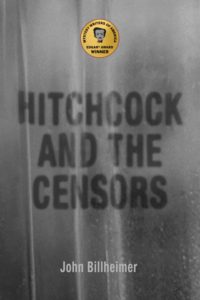Let’s talk books. My favourite kinds of book are biographies and autobiographies. From Tina Fey’s hilarious account of her days as an up-and-coming comedian in her book Bossypants to Sidney Poitier’s insightful look into his professional career in The Measure of a Man: A Spiritual Autobiography, biographies and autobiographies have always deeply influenced me in my work. This October, another influential book will be added to my list, and that book is John Billheimer’s Hitchcock and the Censors.
As the tile tells you, this book details the long career of Alfred Hitchcock, one of the most influential Hollywood directors of all time, and his long battle with the Motion Picture Production Code. This book is extremely engaging and will keep its target audience intrigued until the final page.
I really appreciate the well-researched history that Billheimer put into his book. It really got me hooked in to what was happening by offering tidbits of knowledge—some common, some uncommon—about Hitchcock’s career in the Hollywood film industry. I knew that Hitchcock was a very controversial director, but I didn’t know how much of a controversial figure he really was until I read this book.
For example, I thought it was interesting that in his 1940 Oscar-winning film Rebecca (which was based on famous British writer Daphne du Maurier’s 1938 novel of the same name) Hitchcock changed the ending of the book by making Maxim de Winter innocent of the killings depicted in both the book and the film (in the novel, he is guilty). This is a major change to the film, and it shows the kind of influence that Hitchcock had on the motion-picture industry as a whole.
Billheimer also does a remarkable job in conveying the themes tackled in the book. One of the themes is influence of power and the good ways a powerful individual uses it. For example, in the first act of the book Billheimer talks about how, during the filming of Psycho, Hitchcock decided to shoot the entire movie in black and white to trick the Motion Picture Production Code into letting him show bloody murders, such as the one depicted in the famous shower scene. Arguably, it’s this kind of influence that made Hitchcock’s films so memorable and is a major reason he still holds status as one of the greatest directors of all time.
Billheimer does a great job in documenting the life and career of one of Hollywood’s finest directors in Hitchcock and the Censors. Lovers of film should have no problem falling in love with it like I did.

